EdTech
EdTech Market Overview: Promising Niches and EdTech Startups

The EdTech landscape isn't merely growing, but booming with 65,668 companies and multiple EdTech startups asserting their presence, each aspiring to imprint a unique mark on a diverse field that spans from K-12 to corporate education. Amid this market saturation, creating a distinctive space necessitates considerable analytical acumen and a discerning eye for untapped niches.
Yet, it’s clear that the benchmark for success in EdTech is no longer pegged to just the 'next big idea.' Rather, it's about the integration of groundbreaking technologies like AI, VR, and AR. These technologies are fundamental in crafting highly personalized learning paths that serve as powerful differentiators for firms battling it out in a fiercely competitive market. The proof of that is that over 67% of EdTech unicorns that emerged in EdTech in recent years have used an AI component in their product or services.
From this perspective, how can we pinpoint a potentially thriving niche within the industry? What approach should we take to plan for future scalability? And how do we seamlessly integrate innovative technology into our products to enhance learning outcomes and differentiate our brand?
These are formidable questions, and we're here to provide the answers. Guiding you through the tactics employed by EdTech startups to traverse this competitive territory, we’ll examine how thriving businesses set themselves apart and define their distinctive value proposition.
EdTech market overview: innovations and trends
In 2023, the EdTech market has been a landscape of contrasts. Challenges such as the fluctuating valuation of EdTech companies like Chegg reflect the broader volatility within the global startup ecosystem. Yet, as venture capital flows demonstrate resilience, optimism is cautiously returning. EdTech companies are not merely absorbing investments but actively harnessing emergent technologies like generative AI to redefine the educational sector in both scholastic and corporate spheres.
The competitive fervor is palpable as companies jostle to out-innovate each other. Among the companies who get substantial funding in 2023, we see that it's not just about who's making the big bucks – it's about who's radically innovating, pushing the limits of what’s thought possible in e-learning. Software development for startups is gradually shifting from product delivery mindset to focusing on the most impactful game changers for the niche. These thriving companies aren’t merely resting on their investment laurels; they’re exploring new territories and deploying innovative solutions to cement their market presence.
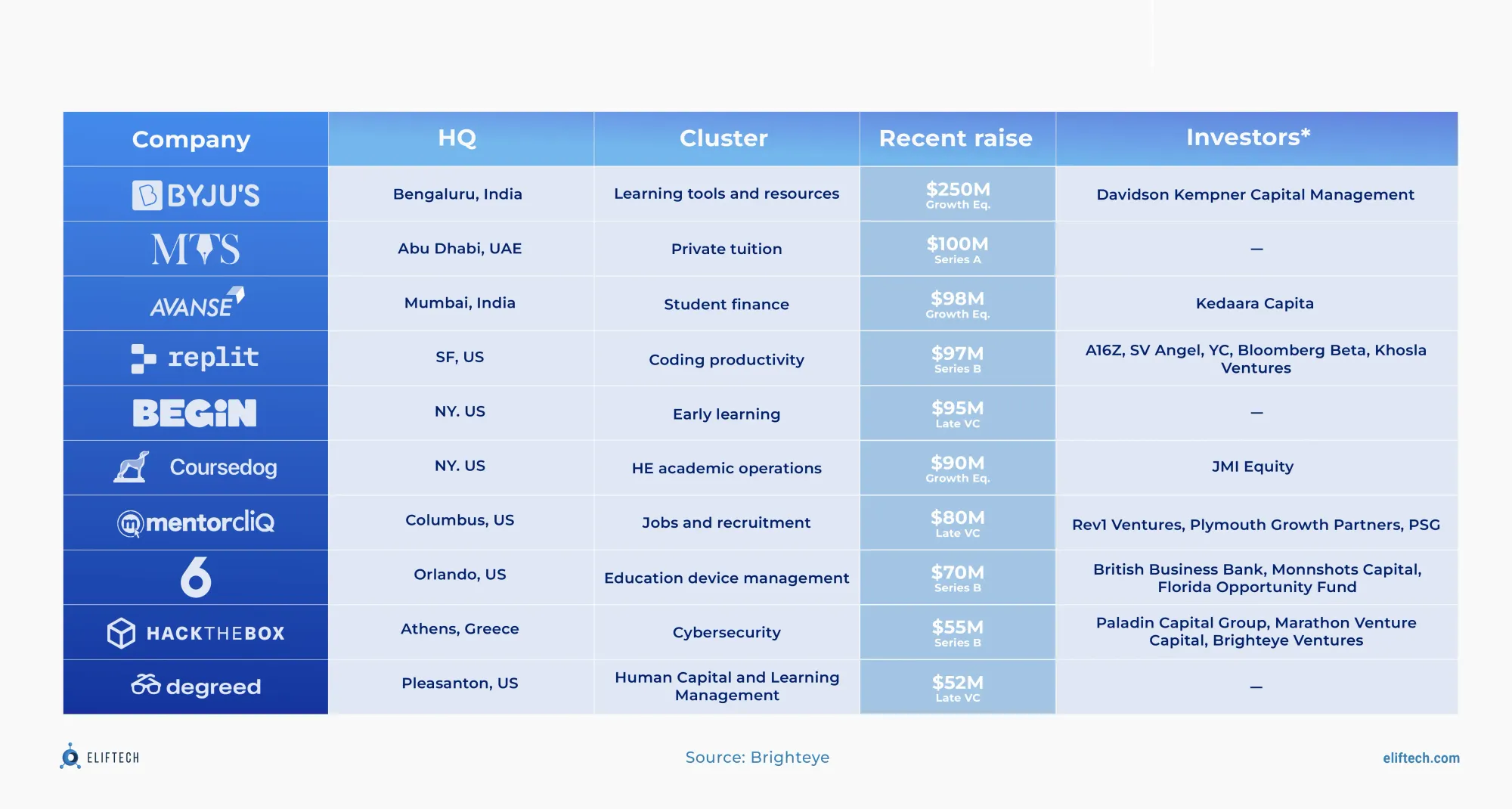
These examples are representative of a broader trend amongst new market entrants who share a common classification under "new delivery models." This category encompasses companies distinguished by their innovative learning solutions that are not bound by traditional methodologies. By incorporating new technologies and pedagogical approaches, they are recalibrating educational paradigms to enhance learning outcomes.
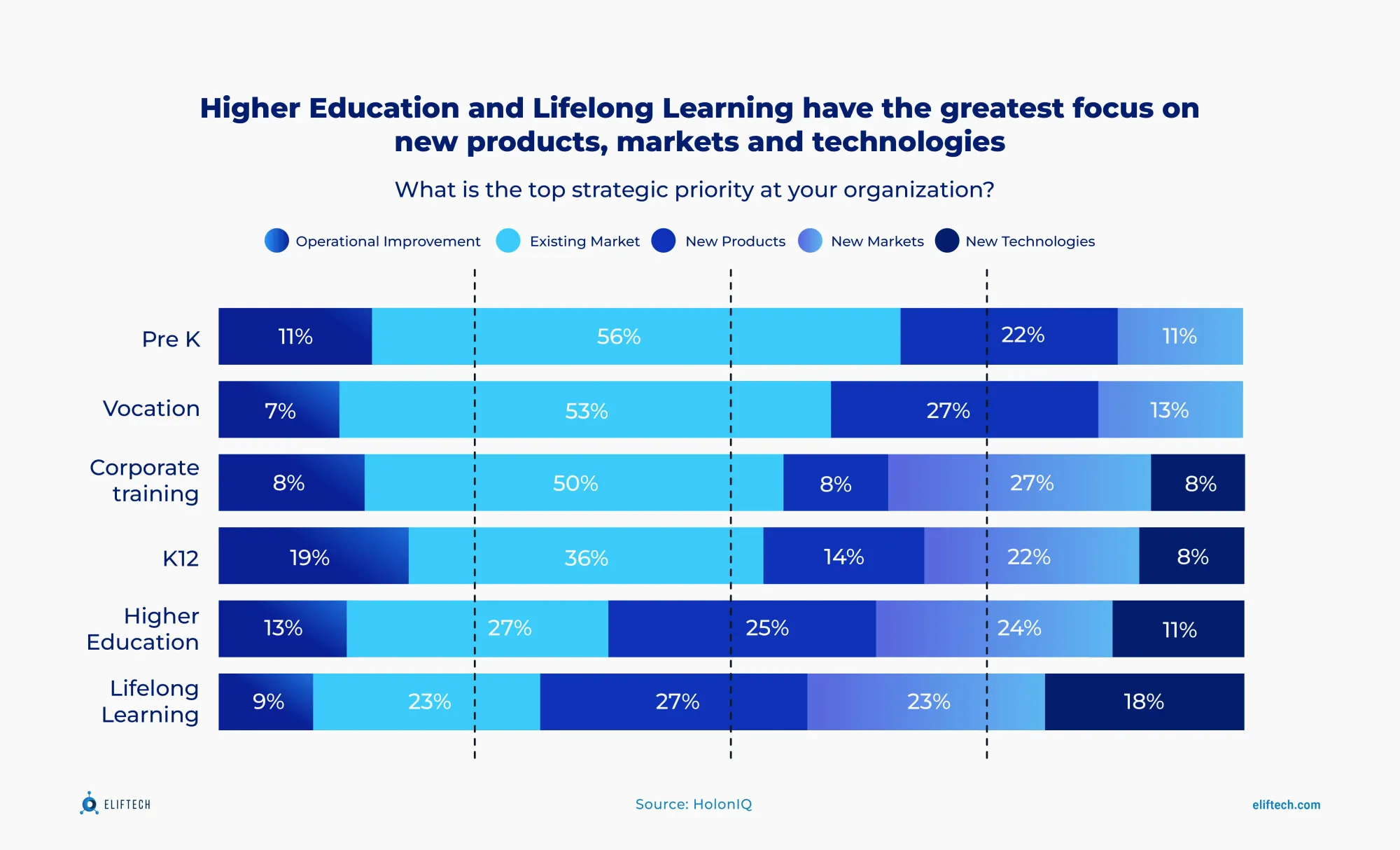
So, what are the market differentiators for EdTech startups?
But is the use of innovative technologies now the only thing to make successful EdTech startups stand out in the crowded market? Standouts truly understand their audience, leverage cutting-edge technology, and genuinely empower their users to achieve their educational goals. They're demonstrating they're not just riding the wave — they're the ones making the waves, reshaping the future of education.
Let’s break down six critical differentiators that are giving some EdTech startups the edge:
- A unique value proposition (UVP)
The Unique Value Proposition (UVP) truly goes beyond just offering something 'better'. A good learning mobile application is about offering something that no one else can, identifying a distinctive niche that your startup can cater to in unprecedented ways. This is something that goes beyond competition; it's about carving your own space in the marketplace. For instance, Replit managed to spot a unique insight – that setting up a coding environment can be prohibitive – and provided an innovative solution that directly caters to the associated needs. Thus, in finding this niche need and addressing it in a unique way, their UVP becomes clear and resonant with their audience.
- User experience and accessibility
Users often complain about the experience (UX) and accessibility of EdTech solutions. Despite the allure of trailblazing EdTech developments, a fundamental disconnect can occur when users struggle with clunky interfaces and inaccessible content. Frustration mounts when learners are met with poor design and unwieldy navigation which impedes rather than aids their educational progress. Successful EdTech companies recognize this pain point and, thus, put a premium on the end-users interaction with their products. Striving to offer more than just an engaging visual interface, they focus on ensuring easy navigation, intuitiveness, and universal design principles.
- Personalized learning paths
Today's learners demand an educational experience tailored to their specific needs, goals, and abilities. Successful EdTech players are tackling this by harnessing data and artificial intelligence to dynamically adapt curriculums. Learning paths are no longer static but fluid, evolving with the learner's progress and feedback. This personalization not only fosters deeper engagements and subject mastery but also provides a sense of ownership and control to the learners. By crafting these individualized learning experiences, EdTech companies are not just meeting the expectation for customization but are paving the way for a more personalized, efficient, and responsive educational landscape.
- The tech that turns heads
Utilizing tech like AI, VR, or AR isn't revolutionary in itself anymore – it's how you apply these technologies to create an educational experience that students can't get elsewhere. Innovation in this sense becomes a game of application for AI EdTech startups, where the goal is to make these technologies work in ways that transform the learning experience into something more intuitive, engaging, and effective.
- Community and collaboration
Building a platform also means building a community. A community can transform solo learning journeys into collective adventures. When learners feel part of something larger, they engage more, learn more, and contribute more, turning your platform into a living, breathing ecosystem.
- Social impact
Lastly, the world is leaning more towards businesses that wield a positive social influence. Successfully integrating social impact into the business model – be it through democratizing education or championing sustainability – can win the trust and loyalty of a generation of learners who will choose purpose as much as they choose products.
Promising niches in 2024 & EdTech companies that excel there
Finding and leveraging a promising EdTech niche can often be the difference between getting lost in the crowd and setting an industry trend. In a saturated EdTech market, it is important to identify where your product can fill the void or where there's untapped potential. Such newfound niches typically exist at the intersection of unmet educational needs and emerging technologies.
A well-defined niche can provide a startup with a targeted customer base more likely to convert because they have a direct need or interest in the product offered. It makes business sense to pursue these specialized segments of the market where competition is less and the potential for growth is high. Moreover, focusing on a niche allows a company to hone its expertise, master their solution, and deliver a product with high value. Here are a few, we would recommend paying attention to in the near future.
Tech-enabled immersive learning
Immersive learning is revolutionizing education, leveraging VR, AR, and MR to simulate real-world environments and visualize intricate concepts. As a burgeoning field, it presents a wealth of opportunities for EdTech startups to innovate and disrupt.
One of the key factors driving this trend is accessible prices for VR equipment. Between 2023 and 2028, prices for VR headsets are predicted to increase by only $4.3 (+1.11%). This makes high-quality immersive learning tools increasingly accessible for educational institutes, thereby expanding the market for EdTech solutions.
Beyond engaging and interactive methods, these tools significantly boost understanding and information retention. Growth potential is vast, particularly in fields such as medicine, engineering, and history where hands-on learning is key.
AR allows viewing 3D models of human bodies, chemical elements, and more, aiding cost-efficiency in schools by reducing the need for physical equipment. VR can also level the playing field for students with limited abilities, offering visual access to otherwise unreachable things. It's particularly beneficial for autistic children, helping them comprehend and practice real-life scenarios.
zSpace

zSpace is an EdTech startup that stands out in the immersive learning space. This company delivers an innovative blend of AR and VR, designed to foster an interactive, engaging learning environment.
What makes zSpace special is its unique application of technology. It provides users with "virtual-holographic" images that can be manipulated using a stylus, facilitating an immersive, hands-on educational experience.
From dissecting virtual frogs in biology to revamping engines in automotive studies, zSpace adds a new, dynamic layer to classroom learning. With an ecosystem of hundreds of learning applications covering a broad spectrum of subjects, zSpace effectively caters to different learning styles and paces, firmly placing it as a front-runner in the EdTech industry.
Innovative K-12 homeschooling
This segment comprises startups that are reinventing homeschooling for K-12 students. They offer a range of services, from curriculum development to interactive learning platforms, tailored to the needs of homeschoolers.
With the growing interest in homeschooling, these startups play a crucial role in providing quality, flexible education options. Their potential is significant in the current climate where parents are seeking alternative education models that can be personalized to their child’s learning style and pace.
The number of school-going children opting for homeschooling in the USA has reached 4.3 million, so it’s not surprising that you can step in to offer new, tech-powered solutions for effective homeschooling.
Outschool
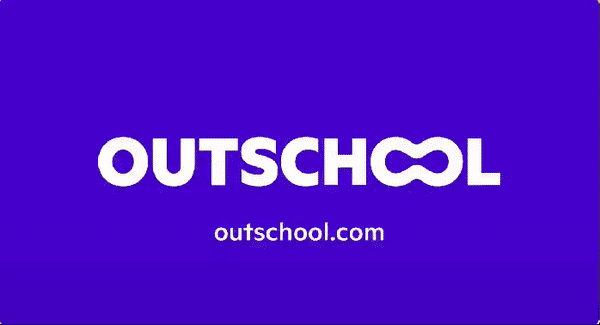
Outschool is an EdTech startup making waves in the K-12 homeschooling sector. They offer a myriad of interactive, small-group classes that reinvent homeschooling by bringing joy back into learning.
What sets Outschool apart is its deep commitment to personalized, interest-based education. Their classes cover not only academic subjects, but also include broad-ranging fields such as coding, arts, music, and even life skills, all taught by experienced independent teachers. This approach allows students to delve into areas of interest often unaddressed in traditional curriculum.
The success of Outschool is evident in its exponential growth, with it reaching a market capitalization of over $1.3 billion, serving large homeschooling communities like the USA where over 3.7 million children are being homeschooled. Its vision of transforming and empowering homeschool education with technology positions it as a key player in the EdTech industry.
Online learning platforms
With the shift towards remote learning, EdTech platforms offering online courses or tutoring are thriving. Users are seeking quality, diverse, and accessible learning resources – any startup bringing innovation and uniqueness in this space has the potential to excel.
Online learning platforms permeated every level of education, from primary school to corporate training programs. But it's not enough just to digitize and upload lessons. Today's users crave a more holistic, personalized experience, almost like Netflix but for learning. So, as you design your platform, think of interactive content, custom learning paths, and social interaction. Moreover, pay close attention to UI/UX – no one wants to learn in a cluttered classroom, virtual or not. Even features like gamification, analytics, and AI-driven recommendations are gradually shifting from a delightful surprise to an expected norm. To truly excel in this niche, you need to predict and meet these evolving demands even before the user articulates them, making learning not just accessible, but irresistible.
360Learning
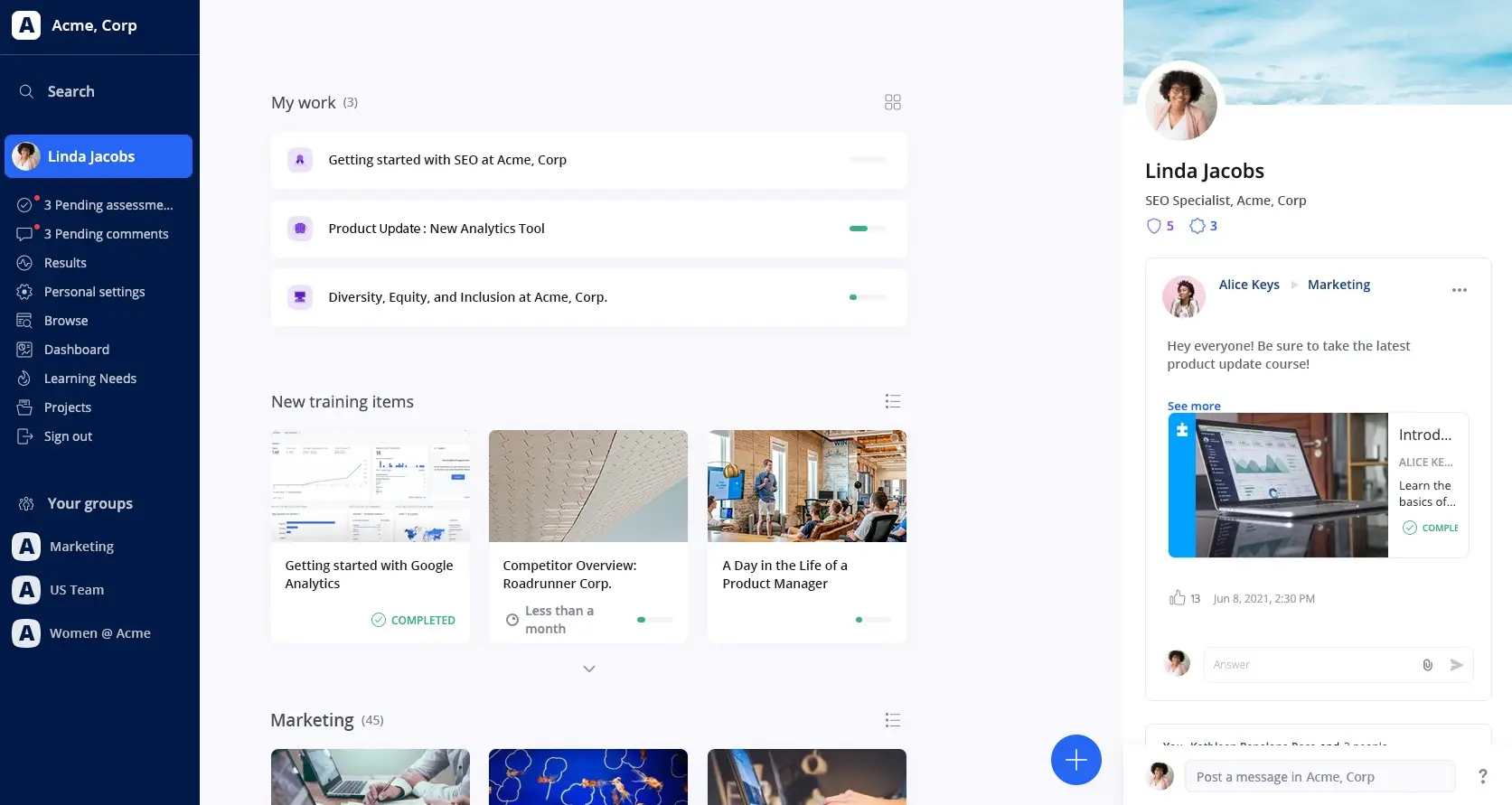
360Learning, an innovative EdTech startup from San Francisco, differentiates itself with an AI-powered collaborative learning platform that champions a virtual social learning environment unlike any other. It shifts from the traditional course-led approach to one that actively promotes a sense of community akin to an interactive study group. This platform is designed to serve both students and professionals, emphasizing a highly personalized and engaging learning experience. Standout features include rapid, AI-assisted course creation, facilitation of content that dynamically evolves based on user feedback, an impressive 91% course completion rate, and a remarkable 60% daily engagement rate. 360Learning offers a fresh angle in the EdTech sector, not just by delivering educational content but by nurturing a dynamic, evolving, and community-centric learning experience that caters to diverse learning communities, from small teams to enterprise-scale operations.
Corporate eLearning
Corporate eLearning involves using digital resources and platforms to deliver training and development programs within organizations. This includes online courses, virtual workshops, and interactive modules for skill enhancement.
Analytics are bread and butter here — they help personalize the journey. They're not just tracking progress, they're scoping out patterns, predicting where a learner might shine or need a nudge. And with tech upgrades, who's to say that the next compliance training won't come via a VR headset, with learners navigating virtual crises? It's a peek into a future where a 'course' is more a launching pad than a checkbox – teams aren't just learning; they're evolving with every module.
Degreed
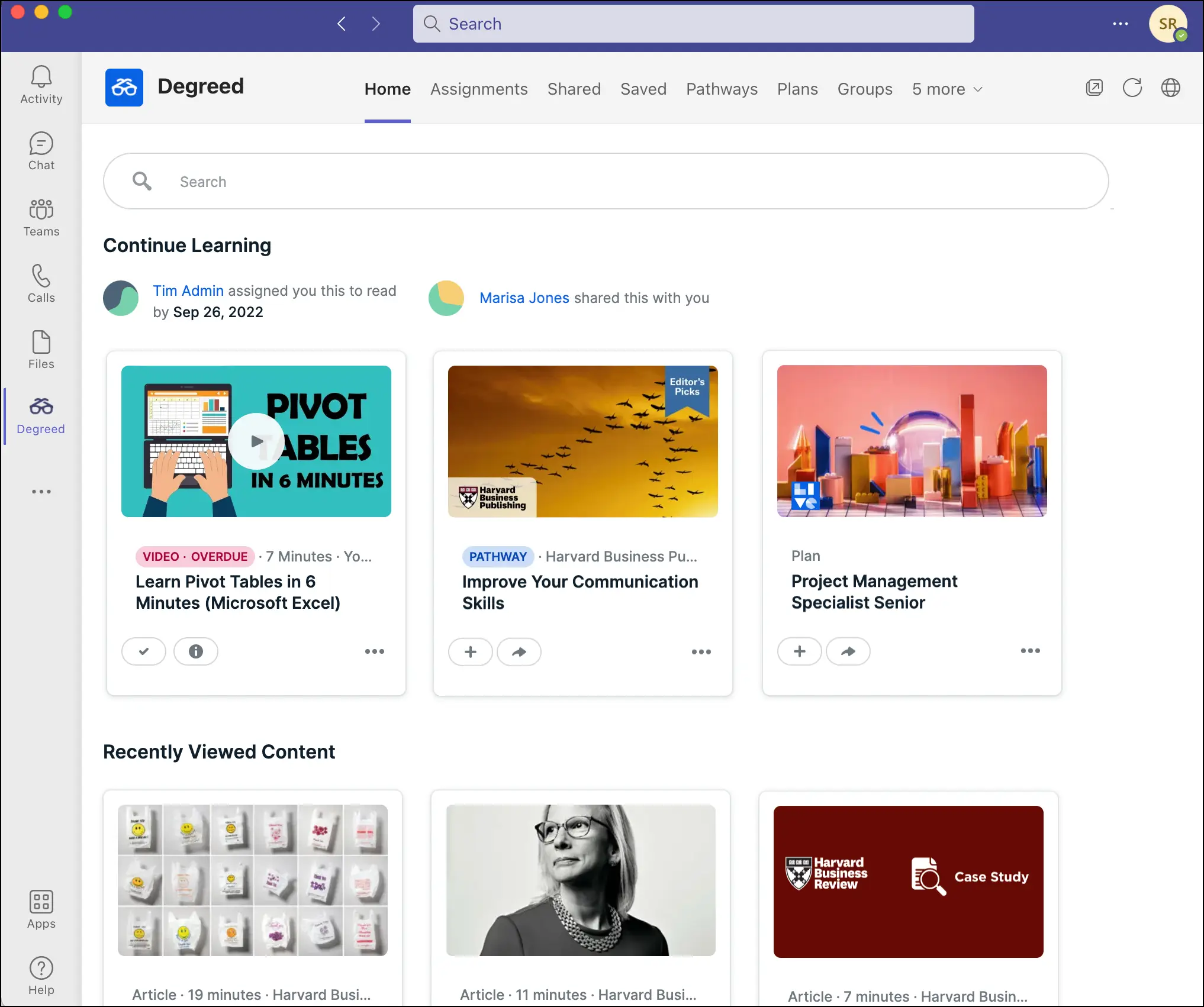
Degreed is an EdTech startup revolutionizing corporate eLearning. The uniqueness of Degreed lies in its holistic approach to learning and development. Integrating skill acquisition with career progression, their platform utilizes advanced analytics for personalized learning pathways.
Degreed's distinguishing feature is its versatility, amalgamating formal and informal learning resources into a unified platform. This approach has resonated within the corporate world and has led Degreed to secure substantial funding. They've raised over $175 million in funds and achieved a billion-dollar valuation, cementing their leadership in the corporate eLearning space.
Self-paced learning management systems
This niche is promising, given the rising need for personalized learning experiences. These tools are not just about letting learners control the 'when' and 'where' of learning; they're transforming the 'how'. They're fostering a learning environment that dynamically adapts to each individual's style, pace, and mastery level, ensuring no one is left behind or feels rushed.
Cognitive computing and AI might be pivotal technologies for startups aiming to break new ground in this area. These technologies are turning self-paced tools into intelligent tutors, capable of customizing content and even predicting learners' needs. As AI becomes more refined, we can anticipate learning experiences that are truly tailored, immersive, and intuitive. For startups willing to venture into this niche, the potential for disruption is evident.
Duolingo
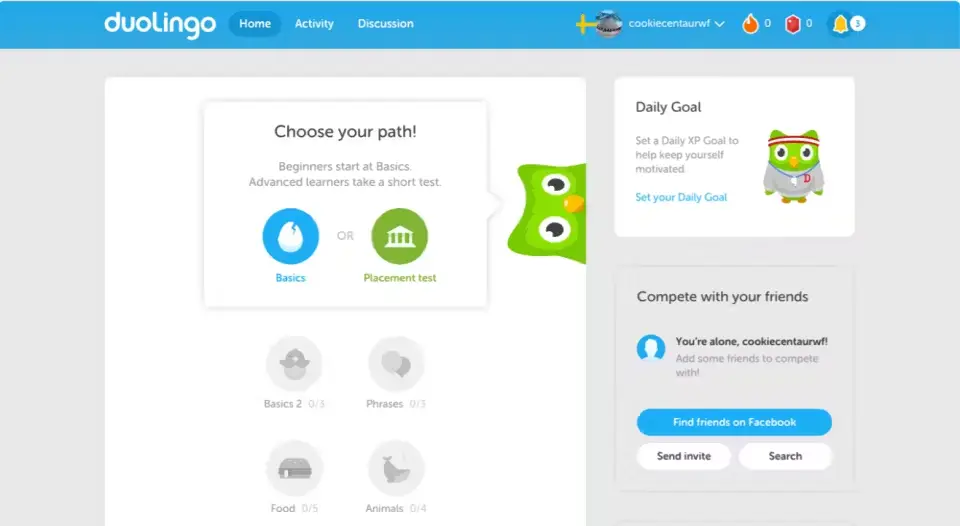
One standout in the self-paced learning niche is Duolingo. This intuitive tool brings together gamification and personalization, creating a unique and motivating language learning experience. As a user's proficiency evolves, the app's adaptive nature provides tailored learning paths enhancing user engagement. Duolingo's innovative features, such as bite-sized lessons, speaking exercises, and reward systems, facilitate regular practice and progression tracking, fueling a joyful learning journey. This adaptive, enjoyable approach enhanced by insightful features has garnered global recognition, raising over $183M million in funding and reaching a $2.4 billion valuation. Duolingo's success distinctly illustrates the impactful potential lying in the self-paced learning space.
100 Edtech startups that change the way we learn
The fascinating landscape of EdTech is constantly changing with new entrants continually disrupting the market. These startups continue to push the boundaries of what is possible in education through technology. They emphasize personalized learning, interactive platforms, and widespread access to educational resources, catering to various learning styles and needs.
- General Assembly - Coding bootcamps and short courses in tech, design, data, business, and more.
- Amplify - Offers products and services that lead to improved teacher effectiveness and student success.
- Branching Minds - Leverages the learning sciences and technology to help districts and schools personalize learning.
- DreamBox Learning - Provides an intelligent adaptive math curriculum for grades K-8.
- ExploreLearning - Offers interactive math and science simulations (Gizmos) and a literacy tool (Reflex) that help students achieve higher test scores.
- PlayPosit - An online learning platform that allows you to create and share interactive video lessons.
- Grockit - Social learning company providing collaborative, fun, and effective online learning products.
- FreshGrade - Creates digital report cards with real-time updates of the child’s progress.
- Shmoop - Provides a wide variety of study materials to students and teachers.
- eSpark Learning - Offers a personalized learning experience for grades K-8.
- Showbie - Combines all the essential tools for assignments, feedback, and communication in one beautiful, easy-to-use app.
- FutureLearn - A digital platform offering free online courses from world-class universities and institutions.
- Socrative - Instantly assess student learning with easily created quizzes, polls, and surveys.
- Boom Learning - A platform enabling teachers to create, sell, purchase, and share resources that integrate with modern classroom technologies.
- Knowledgehook - Develops software that analyzes how well students understand math concepts.
- Pluralsight - Offers a tech-and-business-focused course subscription that includes interactive tools like practice tests, note-taking, and Skill IQ.
- Naviance - A comprehensive college and career readiness platform for middle and high school students.
- Phonics Hero - Offers a step-by-step online reading and spelling program for children.
- GoGuardian - Software for schools that helps protect students online, provides classroom management tools, and data-driven insights for teaching.
- Zulama - Provides a platform for K-12 computer science, programming, and game design blended-learning curriculum.
- Yousician - An interactive music service to learn and play a musical instrument.
- WizIQ - Cloud-based education platform for instructors to train and teach online in real-time, anywhere, anytime.
- VipKid - Connects Chinese students with native speakers to learn English remotely.
- Skillshare - Learning community with online classes taught by the world's best practitioners.
- Reading Eggs - Online reading program that makes learning to read interesting and engaging for kids.
- Prodigy Game - Curriculum-aligned math game for students 1st to 8th grade that’s loved by over a million teachers and 50 million students around the world.
- Picmonic - A visual learning community that helps studies stick with memory-boosting mnemonic pictures & facts.
- OpenSesame - Elearning marketplace that distributes business skills training courses.
- Nuclino - A lightweight and collaborative wiki designed for team knowledge sharing.
- Newsela - Instructional content platform that supercharges reading engagement and learning.
- MasterClass - Offers online classes created for students of all skill levels with instructors who are renowned in their fields.
- LightSail - Adaptive reading platform with a comprehensive library for grades K-12.
- Labster - Provides virtual labs for universities, improving science literacy.
- Greenlight for Girls - Designed to promote science, technology, engineering, and mathematics to girls of all ages and backgrounds.
- BrainPOP - Animated educational content for kids in grades K-12, covering topics across Science, Math, Social Studies, English, and more.
- Rosetta Stone - Online language learning in over 30 languages.
- Coursera - Partners with universities and organizations to offer courses online.
- Seesaw - Student-driven digital portfolios that empower students to independently document what they are learning at school.
- Edmodo - Connects teachers with students and parents to build a classroom community.
- Peergrade - Enables students to provide live feedback on each other’s assignments.
- Khan Academy - Offers practice exercises, instructional videos, and a personalized learning dashboard.
- Quizlet - Learning tools and flashcards, for free, that let you study anything.
- Outschool - Marketplace of live online classes for K-12 children.
- Padlet - A digital bulletin board that students can use to stick notes on.
- Buncee - A creation and communication tool for students, teachers, and administrators.
- UpGrad - Online higher education platform providing rigorous industry-relevant programs designed and delivered in collaboration with world-class faculty and industry.
- Adda247 - One of India's largest and fastest-growing education-technology companies. Caters mainly to students who are preparing for various government jobs.
- Cram - App offering tools to create flashcards for efficient studying.
- Toppr - One of India's leading EdTech platforms with adaptive learning and coaching.
- Unacademy - Indian online learning platform providing lessons in test preparation and vocational training.
- Vedantu - A live online tutoring platform that enables personalized learning.
- CodeMonkey - Game-based learning platform for teaching kids code.
- Learning.com - Provides K-8 solutions to help students, teachers, and schools excel in a digital world.
- Actively Learn - Provides thousands of texts for middle, high school, and higher education.
- Education.com - Provides learning resources in over 20 countries and six continents, with comprehensive learning materials for parents, teachers, and homeschoolers.
- CodeHS - Offers a comprehensive teaching platform for helping students learn computer science.
- Quizizz - Provides multiplayer quiz games that teachers can use in their classroom, with students participating on their own devices.
- Elevate Education - Raises standards in English and Maths through world-class seminar programs.
- MindMeister - Provides a collaborative mind-mapping tool for brainstorming and project planning.
- Twelve a.m. - Offers an insomnia app for people struggling to sleep.
- Boomwriter - Engages kids to read, write, and vote on each other’s work in a fun and competitive environment.
- CK-12 - Non-profit organization that provides free and fully customizable K-12 open-education resources.
- Makers Academy - A highly selective, 12 to 16-week, full-time program that teaches web development.
- Bookful - Brings books to life using augmented reality technology.
- Flipgrid - A website that allows teachers to create "grids" to facilitate video discussions.
- iReady - Integrated system that offers personalized learning activities and real-time data for educators.
- Near Learning - An innovative approach to online education, with hands-on, real-world exercises to help learners develop skills.
- Springboard - Offers online courses with one-on-one mentoring in data science, digital marketing, and other fields.
- Kaltura - Provides video solutions for hybrid classrooms, including video management, creation, and live streaming for education.
- Piazza - A Q&A platform designed to connect students, TAs, and instructors to simulate real-time discussion in a moderated setting.
- Degreed - Offers enterprise learning and upskilling, combining all learning resources into one platform.
- CircleIn - Provides a studying app where students can learn collaboratively online and on their own time.
- Top Hat - Platform designed to engage college students with course materials with dynamic interactive textbooks, course content, and instant feedback.
- CommonLit - Provides a free digital collection of fiction and nonfiction for third through twelfth-grade classrooms.
- BlinkLearning - Edtech company working with digital books and customizable content platforms for schools.
- Classcraft - Turns learning into an adventure with a role-playing game-style system.
- App Academy - Coding school offering online and in-person training programs.
- SchooLinks - A college and career readiness platform with tools for student portfolio building, college planning, and scholarship search.
- Age of Learning - Offers educational software and mobile apps, including the ABCmouse learning program.
- Renaissance Learning - Apps for K-12 assessment, reading, and math practice empower teachers and generate insights for personalized learning.
- Clever - Simplifies and secures the use of technology in the classroom.
- Brainly - Social learning network for students to ask questions about homework and subjects.
- Panorama Education - Helps schools monitor and improve student progress through data analytics and survey programming.
- Guild Education - Offers a platform for employees at Fortune 1000 companies to further their education.
- Achieve3000 - Delivers differentiated literacy instruction for nonfiction reading and writing that’s precise, personalized, and accessible.
- Handshake - Career development platform that connects students with job opportunities.
- Girls Who Code - Non-profit organization aiming to close the gender gap in technology and change the image of what a programmer looks like.
- BetterLesson - Professional learning, coaching, and lesson plans to support adaptive teaching.
- Kodable - Offers a kid-friendly, comprehensive coding curriculum for kids.
- AltSchool - Partners with schools to provide a whole-child, personalized education that fosters student agency.
- Tynker - Provides a creative computing platform for children to learn coding.
- No Red Ink - Builds stronger writers through an interest-based curriculum, adaptive exercises, and actionable data.
- BrightBytes - Translates education data into actionable insights for school administrators.
- Speakaboos - Provides a reading motivation platform that engages children in reading.
- Freckle Education - Provides a differentiation platform across Math, ELA, social studies, and science.
- eSpark Learning - Makes adaptive, digital learning experiences for grades Pre-K through 5.
- Zearn - Top-rated K-5 curriculum building deep understanding and a love for learning math for all students.
- Blackbaud - Provides software and services specifically designed for not-for-profit organizations.
- Microsoft Education - Offers tools to take classroom technology and student engagement further.
- EverFi - Provides digital lessons focused on life skills and critical issues in K-12 schools.
How do successful EdTech startups elevate their game?
In the quest to differentiate and innovate, partnerships with tech providers have become arguably one of the most strategic assets for EdTech startups. These can often offer the much-needed help to meet the challenges of scalability and deliver personalized solutions.
For many EdTech startups, the concept begins as a seed – an innovative solution oriented towards a distinct educational need. However, the journey from ideation to execution, especially in terms of technology development, can be onerous. This journey is replete with challenges, demanding a steep investment of time and resources, fundamentally infused with risk. This is where a tech partnership morphs from a facilitator to a transformative entity.

Tech partner firms, vested in the startup's success, typically offer their deep expertise, infrastructure, and advanced toolkits that drive faster go-to-market strategies. The multifaceted advantages these tech partners may bring to the table in collaboration with EdTech companies include:
- Speedily executed development plans that can profoundly shrink timelines from idea to deployment.
- Augmented resource pool. The infusion of a partner's specialized workforce and technology stacks into the startup's ecosystem can drive progress at a pace that internal resources alone may not manage. It allows startups to tap into a diverse range of expert skills without the long-term commitment of hiring a full staff.
- Sophisticated data analytics capabilities, enabling startups to unlock actionable insights on user behavior, product engagement, and learning outcomes.
- Rich, scalable, and adaptable solutions designed to expand and adjust in line with your growth. As the user base swells, well-engineered, scalable solutions mitigate potential operational risks and ensure smooth functionality.
- Enhanced focus on core competencies and focus on core mission – educational innovation and customer experience.
- Tight, unyielding security frameworks to defend you against data breaches, thus securing your information assets.
- Access to the forefront of innovative technology that ensures the startup is always leveraging up-to-date technology. This enables the startup to stay competitive and optimally function in its market.
- Sustainable technological frameworks ensure that the startup is future-proofed against evolving educational technologies and standards.
Our team has actively collaborated with startups, ushering in innovative technologies and providing critical infrastructure support. Our software development skills, applied in numerous fields including EdTech, are validated by our collaboration with Classwallet, elevating its presence among The North America EdTech top 200.
As an education software development company, we work with EdTech startups looking for ways to elevate their game and get access to innovative technologies. Let's have a look at your infrastructure and processes, and together, we can evaluate how the right partnership can put you on the fast track to success.
